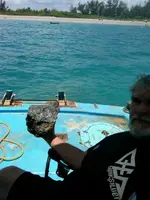To answer your title question: Mel Fisher while searching for the Nuestra Senora de Atocha supposedly claimed to have found many meteorites ... and left them where he found them. Meteorites can be quite valuable. Not sure who owns a meteorite found underwater, though ... maybe Mel was wise to leave them where he found them.
It has been said that meteorites degrade quickly in or near water. "Quickly" is a relative term, though. Would you say a meteorite that oxidizes after 500 years underwater was "quick"? Maybe compared to the age of many meteorites estimated to be 3.5 billion years old or more.
The Willamette Meteorite was found near West Linn, Oregon in 1903. It arrived in Oregon, theorized by Dick Pugh, on an iceberg during one of the Bretz Floods 12,000 to 15,000 years ago. Oregon's acidic rainfall helped oxidize it. But a fusion crust remains visible. Over 15 tons of meteorite remain. Not exactly rapid oxidation, especially considering I found a zinc Lincoln cent recently within 30 miles of West Linn that was nearly completely eaten away, and know of several other local detectorists who have found just the copper sheath of zincolns remaining after 30 years. Keep in mind that most meteorites are 90-95% iron, and 5-10% nickel, or basically stainless steel: the same thing most spoons and forks are made of now.




